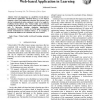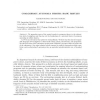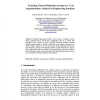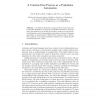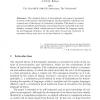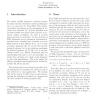125
Voted
IJVR
2008
15 years 2 months ago
2008
Due to its importance as a model for several software and hardware applications, automata theory is a core topic in computer science and engineering education. But because of its m...
118
click to vote
CORR
2008
Springer
15 years 2 months ago
2008
Springer
Abstract. We generalize some of the central results in automata theory to the abstraction level of coalgebras and thus lay out the foundations of a universal theory of automata ope...
119
Voted
LANMR
2007
15 years 3 months ago
2007
Teaching engineering students courses such as computer science theory, automata theory and discrete mathematics took us to realize that introducing basic notions of logic, especial...
153
Voted
CONCUR
2008
Springer
15 years 4 months ago
2008
Springer
A well-known theorem in automata theory states that every context-free language is accepted by a pushdown automaton. We investigate this theorem in the setting of processes, using ...
111
Voted
CONCUR
1998
Springer
15 years 6 months ago
1998
Springer
The classical theory of deterministic automata is presented in terms of the notions of homomorphism and bisimulation, which are the cornerstones of the theory of universal coalgebr...
118
click to vote
ITICSE
2005
ACM
15 years 7 months ago
2005
ACM
This paper describes the first version of P (read “P flat”), a collection of Prolog predicates that aims to provide a pedagogical implementation of concepts and algorithms t...
124
click to vote
SEFM
2006
IEEE
15 years 8 months ago
2006
IEEE
We define a model of labelled product systems of automata and explore its connections with process calculi and trace languages. Bisimilarity of labelled product systems is defin...
129
Voted
FSEN
2009
Springer
15 years 8 months ago
2009
Springer
Automata theory presents roughly three types of automata: finite automata, pushdown automata and Turing machines. The automata are treated as language acceptors, and the expressiv...
SIGMOD
2002
ACM
16 years 2 months ago
2002
ACM
